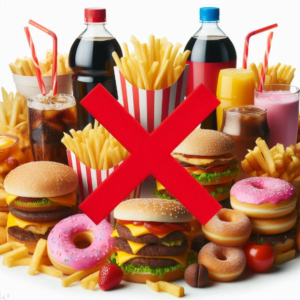What are some foods that can affect your sleep and cause insomnia?
Some foods have the potential to disturb your sleep patterns, which can make it more challenging to get the restful sleep you require. Which foods impact sleep? Let’s delve into a few of the most sleep-disrupting foods in this article.
If you have insomnia, falling asleep and staying asleep can be challenging. Insufficient sleep can leave you feeling fatigued throughout the day, making it difficult to maintain concentration and focus. These factors significantly impact your daily life, influencing your emotional state, ability to bounce back from challenges, and overall health. They can also contribute to various health issues and illnesses. Multiple factors can cause insomnia, and diet is among them.
Caffeinated beverages
Caffeine is a naturally occurring psychoactive compound in coffee, tea, and energy drinks. Because caffeine is a stimulant, it can make it difficult to fall asleep in the first place. More significantly, it tends to wake you up during the night. It also acts as a diuretic, meaning you must go to the toilet. This also contributes to waking you up during the night, which is the last thing you need if you struggle to sleep due to insomnia. Caffeine takes several hours to break down and leave your body completely, so it is best not to consume it after mid-day.
 Caffeine and anxiety
Caffeine and anxiety
Another essential factor to take into account is the correlation between caffeine consumption and feelings of anxiety. Caffeine has a direct impact on the central nervous system. While some individuals may enjoy a temporary surge of energy after consuming coffee or any other caffeinated drink, others may encounter uneasiness and agitation. Excessive consumption of caffeine can result in heightened anxiety levels, potentially exacerbating insomnia.
Research has indicated that individuals who experience chronic anxiety frequently display signs of insomnia, such as struggling to initiate sleep and maintain it throughout the night. These problems can perpetuate one another, resulting in a never-ending cycle of anxiety caused by caffeine and subsequent sleep deprivation.
To minimise the risk of additional sleep struggles, individuals with anxiety should be mindful of their caffeine intake. It is crucial to be aware of how much caffeine one consumes. It is interesting to observe that women generally consume slightly less coffee compared to men. Interestingly, women experience a higher increase in blood pressure compared to men. Discover another compelling reason to eliminate caffeine from your routine: the strong correlation between high blood pressure and insomnia.
Caffeinated Foods
It’s pretty surprising how many foods contain caffeine, something you might not have been aware of. Food items that include cocoa or chocolate, particularly dark chocolate, also contain caffeine. Theobromine, a chemical in this product, is responsible for this effect. In addition, numerous over-the-counter pain medications also include caffeine as an active component. If you struggle with insomnia, it might be more effective to consume this earlier in the day. For the remainder of the day, consuming medication that does not contain caffeine is advisable. Although caffeine has several health benefits when consumed in moderation, it is crucial to be mindful of your daily consumption. This helps prevent any potential adverse side effects, such as anxiety or disruption of sleep. Consider skipping the cup of cocoa at night and opting for a malted milk drink.
It’s worth considering that our genetic makeup can influence how we react to caffeine. Variations in specific genes can significantly impact how even a tiny amount of caffeine can affect sleep patterns.
Your genetic makeup is crucial in determining how your body responds to caffeine, making it an essential factor to consider. Are you struggling to get a restful night’s sleep despite having only a minimal dose of caffeine? If that’s the case, it might be worth exploring whether you have a genetic predisposition to react differently than others.
It’s important to consider that a lack of sleep can lead to the temptation of relying on coffee or energy drinks to stay alert and concentrated throughout the day. Regrettably, this will have an unexpected impact, disturbing your sleep during the night.
If you find yourself grappling with insomnia, it would be wise to steer clear of consuming caffeine in the evening or perhaps even eliminate it from your routine altogether.
Spicy foods
Although no definitive connection exists between consuming spicy foods and experiencing insomnia, they may indirectly contribute to sleep disturbances. These foods can trigger heartburn and indigestion, both of which can make it harder to fall asleep.
When experiencing heartburn and indigestion, it’s important to avoid lying down as it can exacerbate the symptoms. Stomach acid tends to go up into the throat, causing a burning sensation along the delicate lining of the stomach-throat tube (oesophagus). Eating spicy foods, like those seasoned with ginger, chilli, or pepper, can increase the body’s temperature. Proper sleep hygiene protocols emphasise the importance of cooler temperatures for optimal sleep quality. If you struggle with insomnia, it’s crucial to avoid anything that increases your body temperature.
Spicy food and nightmares
There have been reports suggesting that consuming spicy foods may have an impact on sleep patterns. Based on this evidence, it appears that they have the potential to cause unsettling nightmares and peculiar dreams. There is a lack of scientific research supporting this claim. Nevertheless, there is compelling evidence to suggest that elevated temperatures, like a fever, can trigger these distressing hallucinations during sleep. Although the connection may be weak, it could have some validity. If you have a fondness for spicy cuisine and are experiencing unsettling nightmares that disrupt your sleep, it may be time to pay attention to their message.
If you struggle with insomnia, it might be worth considering avoiding spicy food for at least three hours before bedtime.
Fatty foods
Imagine the setting: you’ve just had an incredible night out, the bars are clearing out, and you decide to stop by the local chip shop. Although the allure of indulging in chips and a greasy kebab may be strong, particularly when your senses are numbed by alcohol, it’s worth considering whether consuming a high-fat meal right before bedtime is a wise choice. Like spicy foods, consuming meals rich in fat, particularly saturated fat, can disrupt your ability to get a good night’s sleep.
During sleep, the digestive system experiences a decrease in activity. The human body is naturally designed to process food more efficiently during the daytime rather than at night. Consequently, when enzymes are in short supply and digestion slows down in the evening and night, it can result in indigestion. This is exacerbated when lying down, as gravity does not assist in food movement through your digestive system. Consuming high-fat foods before going to bed can harm your sleep quality. This is because it can cause discomfort and pain in your stomach and gut, making it difficult to fall asleep or causing you to wake up during the night.
In addition, consuming fatty foods shortly before bedtime can influence the speed at which you drift off to sleep, the calibre of your sleep, and the rejuvenating and healing advantages of sleep. Regrettably, the situation becomes even more unfavourable for women.
A recent study has indicated that consuming fatty foods may hinder the release of melatonin, the hormone responsible for regulating sleep. This intricate biological process occurs within cells and involves the enzyme P-elF2α.
For those struggling with insomnia, it’s vital to steer clear of fatty foods near bedtime and ideally eliminate them.
Sugar
It is generally advised not to consume food at night. However, we can optimise our digestive system’s functionality by allowing it to repair and rest. Enzymes and hormones responsible for digestion throughout the day undergo degradation. Resetting your gut can provide a fresh start for the next day.
Avoid sugary foods in the evening
The human body typically stores a reserve of fat, a source of energy to sustain itself for a limited period without food. Nevertheless, consuming a meal high in sugar or with a high glycaemic index in the evening can lead to a momentary surge in energy and leave us feeling restless.
When sugar enters our bloodstream quickly and is soon followed by a crash, it can trigger feelings of hunger. It can be pretty challenging to get a good night’s sleep. It’s certainly not ideal to go to bed on an empty stomach, especially if you struggle with insomnia. Indulging in additional snacks before bed will only worsen the issue of undigested food lingering in the digestive system. As detailed in the relevant section, indigestion and heartburn can be caused by consuming fatty foods.
Many individuals enjoy a warm, creamy beverage before retiring for the night. If you engage in such practices, you should refrain from incorporating sugar into your diet, as scientific research has established a correlation between consumption and sleep duration.
Consuming sugary foods before bedtime can disrupt sleep by triggering unpleasant dreams or nightmares. To ensure a restful night’s sleep, it is best to avoid sugary treats before turning in.
If you find it difficult to fall asleep, you may not have considered the impact that your diet can have on your sleep patterns. Insomnia can be triggered by various foods, including caffeine, fat, sugar, and spices, which are known to be the primary culprits. Now, you possess the valuable knowledge of which foods can impact your sleep. Rest assured, your battle with insomnia will soon be a thing of the past.
You might find this article helpful if you need more information on improving sleep.
References
The link between caffeine and insomnia
How processed carbs affect your sleep
How food and diet disturb sleep
The article: Is food sabotaging your sleep? Change your diet to improve your sleep, which appeared first on Jane Stevens Nutrition Evesham.
The Article: Are You Sleeping Poorly? Change Your Diet. appeared first on Jane Stevens.
The Article Are You Sleeping Poorly? Change Your Diet. Was Found On https://limitsofstrategy.com




Recent Comments